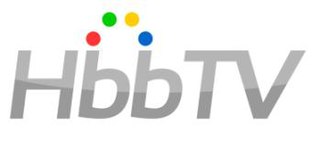
A set-top box (STB), also known as a cable box, receiver, or simply box, and historically television decoder or a converter, is an information appliance device that generally contains a TV tuner input and displays output to a television set, turning the source signal into content in a form that can then be displayed on the television screen or other display device. It is designed to be placed alongside or "on top" of a television set.

Digital Video Broadcasting (DVB) is a set of international open standards for digital television. DVB standards are maintained by the DVB Project, an international industry consortium, and are published by a Joint Technical Committee (JTC) of the European Telecommunications Standards Institute (ETSI), European Committee for Electrotechnical Standardization (CENELEC) and European Broadcasting Union (EBU).

Hellenic Telecommunications Organisation S.A. is the largest technology company in Greece. It is one of the three largest companies listed in the Athens Stock Exchange, according to market capitalization.

Internet Protocol television (IPTV), also called TV over broadband, is the service delivery of television over Internet Protocol (IP) networks. Usually sold and run by a telecom provider, it consists of broadcast live television that is streamed over the Internet (multicast) — in contrast to delivery through traditional terrestrial, satellite, and cable transmission formats — as well as video on demand services for watching or replaying content (unicast).

Malaysian television broadcasting was introduced on 28 December 1963. Colour television was introduced on 28 December 1978. Full-time colour transmissions were officially inaugurated on New Year's Day 1982. There are currently 16 national free-to-air terrestrial television channels in Malaysia and 3 national pay subscription television operators in Malaysia.

Telenet Group N.V. is the largest provider of cable broadband services in Belgium. Its business comprises the provision of analog and digital cable television, fixed and mobile telephone services, primarily to residential customers in Flanders and Brussels. In addition, Telenet offers services to business customers all across Belgium and in Luxembourg under its brand Telenet Solutions.
A1 Bulgaria is a telecommunications company in Bulgaria owned by A1 Telekom Austria Group.
Vivacom is the largest telecommunications company in Bulgaria and a former state-owned incumbent operator. The company is headquartered in the capital city Sofia and employs around 5,900 people, owning a mature distribution network with around 230 branded retail outlets and alternative sale points.
IP over DVB implies that Internet Protocol datagrams are distributed using some digital television system, for example DVB-H, DVB-SH, DVB-T, DVB-S, DVB-C or their successors like DVB-T2, DVB-S2, and DVB-C2. This may take the form of IP over MPEG, where the datagrams are transferred over the MPEG transport stream, or the datagrams may be carried in the DVB baseband frames directly, as in GSE.
Nova Telecommunications & Media S.M.S.A. is a telecommunications company in Greece which provides broadband, television, mobile and fixed services. It also offers satellite services in Cyprus. It was traded on the Athens Exchange until its delisting in 2021.
Television in Romania started in August 1955. State television started to broadcast on 31 December 1956. The second television channel followed in 1968, but between 1985 and 1990, there was only one Romanian channel before the return of the second channel. Private broadcasters arrived in December 1991, with SOTI which was the first private nationwide television station in Central and Eastern Europe. Romania has the highest penetration rates for pay television in the world, with over 98% of all households watching television through cable or satellite.
Television in Belgium was introduced in 1953 and began with one channel each in Dutch and French. The country is heavily cabled, with 93% of households watching television through cable as of 2003.

Hybrid Broadcast Broadband TV (HbbTV) is both an industry standard and promotional initiative for hybrid digital TV to harmonise the broadcast, Internet Protocol Television (IPTV), and broadband delivery of entertainment to the end consumer through connected TVs and set-top boxes. The HbbTV Association, comprising digital broadcasting and Internet industry companies, has established a standard for the delivery of broadcast TV and broadband TV to the home, through a single user interface, creating an open platform as an alternative to proprietary technologies. Products and services using the HbbTV standard can operate over different broadcasting technologies, such as satellite, cable, or terrestrial networks.

GlobeCast World TV was a television via satellite service received in North America via the Galaxy 19 satellite, providing ethnic television and audio channels. It was a service by Globecast, a subsidiary of Orange. In North America, the satellite broadcasts dozens of Arabic and Asian channels.
Blizoo was a Swedish telecommunications operator in Macedonia and Bulgaria. In Bulgaria it was formed by merging two of the biggest television operators in the country — Eurocom Cable and CableTel, in 2010. It was acquired by Mtel on 29 July 2015. The two operators merged their TV offerings on 1 June 2016, and then merged completely on 12 April 2017. In Macedonia Blizoo acquired CableTel on 11 November 2011 and later merged to one.VIP operator on 11 May 2016.
The distribution of cable television around the world:

Ziggo B.V. is the largest cable operator in the Netherlands, providing digital cable television, Internet, and telephone service to both residential and commercial customers.
United Group is an alternative telecom provider in Southeast Europe that operates both telecommunications platforms and mass media outlets.








